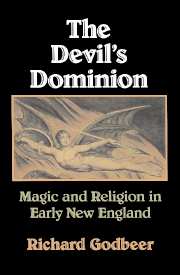Book contents
- Frontmatter
- Contents
- Acknowledgments
- Prologue
- Introduction
- 1 Magical Experiments: Divining, Healing, and Destroying in Seventeenth-Century New England
- 2 The Serpent that Lies in the Grass Unseen: Clerical and Lay Opposition to Magic
- 3 Entertaining Satan: Sin, Suffering, and Countermagic
- 4 Sinful Curiosity: Astrological Discourse in Early New England
- 5 Insufficient Grounds of Conviction: Witchcraft, the Courts, and Countermagic
- 6 Rape of a Whole Colony: The 1692 Witch Hunt
- Epilogue
- Appendix A Witchcraft Trials in Seventeenth-Century New England (Excluding Persons Accused During the Salem Witch Hunt)
- Appendix B Persons Accused During the Salem Witch Hunt
- Name Index
- Subject Index
3 - Entertaining Satan: Sin, Suffering, and Countermagic
Published online by Cambridge University Press: 05 October 2010
- Frontmatter
- Contents
- Acknowledgments
- Prologue
- Introduction
- 1 Magical Experiments: Divining, Healing, and Destroying in Seventeenth-Century New England
- 2 The Serpent that Lies in the Grass Unseen: Clerical and Lay Opposition to Magic
- 3 Entertaining Satan: Sin, Suffering, and Countermagic
- 4 Sinful Curiosity: Astrological Discourse in Early New England
- 5 Insufficient Grounds of Conviction: Witchcraft, the Courts, and Countermagic
- 6 Rape of a Whole Colony: The 1692 Witch Hunt
- Epilogue
- Appendix A Witchcraft Trials in Seventeenth-Century New England (Excluding Persons Accused During the Salem Witch Hunt)
- Appendix B Persons Accused During the Salem Witch Hunt
- Name Index
- Subject Index
Summary
And the man said, “The woman whom thou gavest to be with me, she gave me of the tree, and I did eat.”
And the Lord God said unto the woman, “What is this that thou hast done?” And the woman said, “The serpent beguiled me and I did eat.”
Gen.3.12,13.Samuel Parris, pastor at Salem Village, Massachusetts, was convinced that when Mary Sibley, a member of his church, turned to countermagic in an attempt to cure her niece, she did so “ignorantly.” Sibley was apparently an unwitting transgressor, who did not realize that experimenting with magic was illicit. Other godly layfolk also used magical techniques “in their simplicity,” to use Increase Mather's words. Lay recourse to magic shocked New England ministers, yet the clergy themselves may have been partly responsible for this state of affairs. Ambiguity in Puritan teaching on one central issue, the allocation of responsibility for human sin and misfortune, may have prompted layfolk to turn to countermagic as a defense against affliction. Inadvertently, from their own pulpits, the New England clergy promoted a rival supernatural agency.
Liability for sin and suffering was a matter of crucial importance to Puritans, yet there was no consensus within the godly community on this issue. Samuel Parris saw the afflictions in Salem Village as divine punishment for the villagers' backslidings; he felt that this was as much his as their responsibility and so adopted a course of repentant prayer and fasting.
- Type
- Chapter
- Information
- The Devil's DominionMagic and Religion in Early New England, pp. 85 - 121Publisher: Cambridge University PressPrint publication year: 1992



